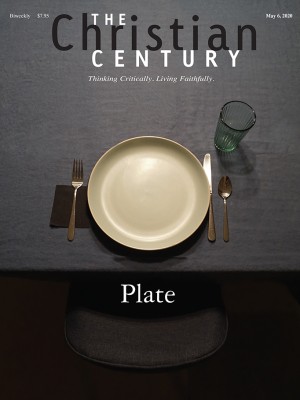How do we keep time during a pandemic?
When all days seem alike, maybe the best unit of measure is love.

The coronavirus pandemic has been measured out for me in Sundays. On the First Sunday in Lent, at the university church where I’m the interim minister, I encouraged people to be attentive to how those around them were feeling during the passing of the peace. Don’t offer a hug or a handshake if others seem reluctant to touch, I said during the greetings; as you know, there’s a virus abroad. We did a lot of elbow bumping that day, smiling and laughing.
By the Second Sunday in Lent, the university had forbidden gatherings of more than 100 people, so my colleagues and I led worship in an empty church while the congregation listened over the radio. It’s our practice each week to extend the welcome of the church to “those listening on the radio and online.” With the world turned upside down, I could suddenly hear how condescending my welcome to those listening outside the sanctuary had been. The far-flung radio congregation to which I gestured each week had been revealed as a community faithfully engaged in keeping a space of worship open for anyone to join, a space into which we were now all crowding. Rather than being welcomed by those sitting in the sanctuary, our radio listeners were now welcoming us.
Read our latest issue or browse back issues.
By the Third Sunday in Lent, our students had been sent home, and I walked to the empty church through a campus that was unsettlingly still. On the Fifth Sunday in Lent, I preached a sermon into my phone, sitting under a blanket in my bedroom to muffle the echo. Across town, our choir director recorded himself playing the hymns on his piano, our associate ministers recorded the confession and the pastoral prayer, a faculty member sheltering with his family in Virginia recorded the readings, and another colleague pieced a worship service together from those fragments. On Sunday, all of us listened and worshiped together—ministers, musicians, staff, students, longtime congregants, everyone.
Time has been fearfully compressed in these weeks, with epoch-making changes happening every few days. We’ve experienced something that people living through wars and other harrowing events know all too well: the way history can barrel forward so quickly that it threatens to swallow up the distinctiveness of our lives and press on us its own defining mark.
Having the Sundays of Lent to hang this experience on helped our community orient itself in time. As the renunciations piled up—the giving up of touch, of proximity, of being together in sacred spaces—the season of Lent was there to receive them and to help us weigh their meaning. As I write we are preparing to celebrate Easter at the highest point of the curve that we’ve all been trying to flatten. I can’t decide if time seems out of joint or if Easter is right where we need it to be.
Even with the scaffolding of the liturgical year, it’s been difficult to keep track of time. When I check my email each day, I find messages from students and colleagues sent at two or three in the morning, and I’ve sent plenty of middle-of-the-night emails myself. It’s hard to keep track of time when time itself feels like it’s bristling with panic or weighed down by grief, when it is filled to overflowing with video calls, or emptied of work and connection, or made dense and opaque by illness. We’re all looking for ways to distinguish one day from another, to make weekends feel different from weekdays, to keep ourselves anchored. Conversations often turn to the resources we’re drawing on: morning prayer, morning yoga, singing circles, reading groups.
Last week, in my class on contemplative prayer, a student gave a presentation on The Cloud of Unknowing, an anonymous 14th-century mystical text. The student drew our attention to the author’s discussion of time. Nothing is more precious than time, The Cloud teaches, because that’s where God reaches us. Keeping time, tending time, and spending time all matter. We should strive to be like the saints, The Cloud says, who “keep exact account of time by means of love.”
The most tempting way to keep account of time these days is in increments of how long it will take for things to go back to the way they were. Will it take four weeks, eight weeks, all summer, a year? How long until we can put all this behind us?
I long for the day when I can teach in a classroom and worship in a church and fly on a plane to visit my parents. Love makes me count the hours. But keeping account of time by love with the saints also means resisting the desire to go back to the way things were. Because that way is marked by economic and social inequality that has made the burden of this virus fall hardest on the most disadvantaged, by a health-care system that leaves so many unprotected, by the ridiculously low pay that people doing the most necessary jobs receive. None of this can be accounted for by love. It’s not enough to want our old life back. Especially in the season of Easter, we are called to make room for more life—not just for ourselves, but for everyone.
If there’s one thing we’ve learned through the work of social distancing, it’s that everyone’s life matters to everyone else’s. As we struggle to inhabit the time we have been given, that’s a measurement by which to keep account of our days.
A version of this article appears in the print edition under the title “Keeping time.”







